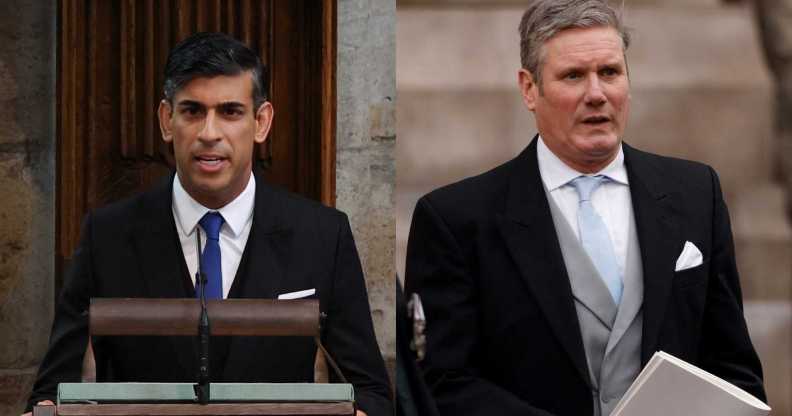Sunak and Starmer criticise decision to stop Zelenskyy speaking at Eurovision grand final

Rishi Sunak and Keir Starmer have united in criticising the decision to prevent the Ukrainian president from addressing Eurovision. (Getty)
Rishi Sunak and Keir Starmer have criticised the decision to deny Ukrainian president Volodymyr Zelenskyy’s request to speak at the Eurovision grand finale.
The Tory prime minister and Labour leader were united in their disapproval of the European Broadcasting Union’s (EBU) rejection of Zelenskyy’s video address.
The EBU, which produces Eurovision, said that although Zelenskyy had “laudable” intentions, his address would breach the event’s guidelines on political impartiality.
Eurovision 2023 would have been hosted by last year’s winners, Ukraine, but due to the ongoing conflict in the Eastern European country, the UK has taken over hosting duties in Ukraine’s stead.
Russia invaded Ukraine in February 2022, triggering Europe’s largest refugee crisis since World War II.
The song contest is supposed to be a “non-political event”, with its rules stipulating that all participating broadcasters, including the host, ensure that Eurovision “shall in no case be politicised and/or instrumentalised and/or otherwise brought into disrepute in any way”.
However, the event has not been without previously political controversies. In 2009, when Eurovision was held in the Russian capital of Moscow, Georgia withdrew from the competition following requests for changes to some of the lyrics in their entry.
Russian forces had invaded Georgia the previous year, and the former Soviet republic’s song was entitled “We Don’t Wanna Put In”. The chorus sounded like entrants Stephane & 3G were singing “we don’t want no Putin”.
Russia was banned from competing in Eurovision last year after the invasion of Ukraine, a decision that was upheld by the EBU for 2023.
On Friday (12 May), the UK’s prime minister, Rishi Sunak, said he was “disappointed” with the EBU’s call, sentiments that opposition leader Keir Starmer then echoed.
Sunak’s official spokesperson said: “The prime minister believes it would be fitting for President Zelenskyy to address the event and we’re disappointed by the decision from the European Broadcasting Union.
“The values and freedoms that President Zelenskyy and the people of Ukraine are fighting for are not political, they’re fundamental, and Eurovision themselves recognised that last year when they rightly suspended Russia’s participation from the competition.”
In a statement, Starmer agreed, saying: “It’s vital that we all continue to keep the plight of the Ukrainian people front of mind as they stand up to Russian aggression on behalf of us all.
“Eurovision is an expression of international unity and freedom, and President Zelenskyy should be able to address it as a great defender of both.”
Former Conservative prime minister Boris Johnson also said “it would have been right” for Zelenskyy to speak during the grand final.
Who is in the Eurovision 2023 grand final?
According to the BBC, Eurovision 2023 is expected to garner an audience of over 160 million viewers worldwide.
Qualifying for the grand final are Austria, Portugal, Switzerland, Poland, Serbia, Cypress, Sweden, Albania, Estonia, Finland, Czechia, Australia, Belgium, Armenia, Moldova, Norway, Lithuania, Israel, Slovenia and Croatia.
Due to their financial contributions to the event, five nations – Germany, France, Spain, Italy and the UK – are automatically included in the final, along with last year’s winners, Ukraine.
The Eurovision Song Contest grand final takes place on Saturday (13 May) and airs on BBC1 from 8pm.
How did this story make you feel?

